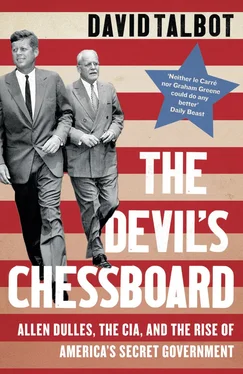After this, Dollmann abruptly disappeared from the CIA documentary record. The astute colonel undoubtedly realized that he had pushed his luck with the agency as far as he should, and, for his own good, it was time to retire from the spy game. He lived on for three more decades, trading on his notorious past to get by. He was a good storyteller, and his two colorful memoirs sold briskly in Europe. His astonishing tales even proved, for the most part, to be true. Dollmann also made frequent appearances on European television, and dabbled a bit in his beloved cinematic arts, writing the German subtitles for Fellini’s La Dolce Vita .
In 1967, an American writer named Robert Katz, who was working on a book about the Ardeatine Caves massacre, tracked down Dollmann, finding him in the comfortable residential hotel in Munich where he would live out the rest of his days. At sixty-seven, the silver-haired and still trim Dollmann seemed quite content with his life. His sunny garret in the blue-painted hotel was cluttered with photos, books, and memorabilia that recalled his former life. He was perfectly happy to live in the past, Dollmann told his visitor—after all, he had begun his career as a historian, until he was kidnapped by history.
At one point, Dollmann brought up Allen Dulles, his old American benefactor. Dulles had recently published The Secret Surrender , his Operation Sunrise memoir, and Dollmann was upset to read the spymaster’s description of him as a “slippery customer.”
“ From the little English I know,” Dollmann told Katz in his perfect Italian, “‘sleeperee coostomer’ is not exactly a compliment. Is it?”
Katz explained that it meant someone who was shrewd, cunning, Machiavellian.
The colonel broke into a radiant smile. “Oh! That is a compliment—for me.”
Allen Dulles’s wife, Clover, and his wartime mistress, Mary Bancroft, were both patients of Carl Jung. Mary began treatment with the man who was the second pillar of modern psychology in the 1930s, after moving to Zurich with her new husband, a Swiss banker. Clover entered analysis with Jung after reuniting with Allen in Switzerland in the final months of the war. The extroverted Mary got an electric charge from her connection to the great man, intellectually sparring with him, swapping gossip, and, although he was nearly three decades older, openly flirting with him. Clover, whom Jung quickly sized up as a classic introvert—sensitive, reticent, dreamy—had a more troubled reaction to him, and she terminated their relationship after a few sessions in favor of one of his disciples, a brilliant Jewish female analyst named Jolande Jacobi, who had fled the Nazi invasion of Vienna. After twenty-five years of marriage to Allen Dulles, Clover had had her fill of domineering men. Jung clearly was much more in touch with his female “anima” than her husband. But, still, the imposing figure struck her as “ arrogant” and made her feel small in his presence. With his gray mustache, rimless spectacles, and ever-present pipe, Jung even bore some resemblance to her husband.
Despite their striking personality differences—and their awkward romantic triangle—Clover and Mary developed a unique friendship that would last the rest of their lives. With her keen intuition, Clover sized up the situation soon after arriving in Bern in January 1945. Finding herself alone with Mary one day, she reportedly told her rival, “ I want you to know I can see how much you and Allen care for each other—and I approve.” This story gives Clover an authority over Allen’s amorous adventures that, in reality, she sorely lacked. In truth, no woman in Dulles’s life enjoyed this type of leverage over him. Even Mary Bancroft—who was allowed to participate in some of his secret life as his wartime courier, translator, confidante, and bedmate—would struggle for years to decipher her relationship with Dulles, which she called “ the most complex and overwhelming” connection of her life.
Clover and Mary were bound by their mutual fascination and bewilderment with Dulles. But the two women’s joint effort to understand the puzzle that was Allen Dulles was a doomed enterprise. On the surface he was full of a charm and gaiety that promised entry into a world of fascinating dignitaries and dazzling conversation. His air of mystery only seemed to add to his allure. But as the women in his life sought more from him, Dulles only revealed a deeper and deeper emotional impenetrability. Even in the life-and-death throes of wartime espionage, Dulles seemed untouched by the intense human drama swirling around him. Mary would always remember “ those cold, blue eyes of his” and “ that rather peculiar, mirthless laugh.”
In her effort to find out more about the man at the emotional center of her life, Mary sought enlightenment from the great Jung. She made her way down the long, tree-lined path to his home on Lake Zurich, above whose elaborate stone portal was etched in Latin: Vocatus atque non vocatus deus aderit (“Called or uncalled, God will be present”). Jung was alive to the potential of the supernatural. He believed in demons and angels. The inscription reminded Jung, who said he always felt “unsafe,” that he was “ in the presence of superior possibilities.”
Jung enjoyed discussing men of power and action like Dulles. Analyzing the dictators of his era who held the fate of Europe in their hands, he had developed various power “archetypes.” Jung deemed Hitler a “medicine man” who ruled more through magic than political power. Whereas Mussolini projected the brute strength of a tribal chief, Hitler seemed to lack not just physical potency but basic human qualities. His power came from his uncanny “mystical” ability to tap into the German people’s deeply troubled unconscious.
Before the war, standing near the two leaders at a Berlin military parade, Jung once had the occasion to observe Hitler and Mussolini together. Jung recalled the revealing experience for an interviewer in October 1938. While Mussolini greeted the goose-stepping troops and trotting cavalry horses “with the zest of a small boy at the circus,” Hitler showed no emotion. He appeared to Jung like “a mask, like a robot, or a mask of a robot… He seemed as if he might be the double of a real person, and that Hitler the man might perhaps be hiding inside like an appendix, and deliberately so hiding in order not to disturb the mechanism.
“What an amazing difference there is between Hitler and Mussolini!” Jung exclaimed. “I couldn’t help liking Mussolini … You have the homely feeling with Mussolini of being with a human being. With Hitler, you are scared.”
Jung’s portrait of Hitler is as chilling a picture of psychopathology as you will find. Dulles was fascinated by his insights into the German leader, and he urged Mary to keep seeking more such wisdom from Jung.
The esteemed psychoanalyst was happy to oblige. The two most powerful men in Mary Bancroft’s life were intrigued with each other, though they had little direct communication. Jung had a hard time figuring out Dulles. He did not fit neatly into the Jungian system of power archetypes. One could see in Dulles the same disturbing mix of magnetism and ruthlessness that Jung observed in the dictators of his day. But there was also an impenetrable blankness that made him hard to read. Jung warned Mary that her lover was “ quite a tough nut.”
Dulles, for his part, approved of his wife and mistress’s submitting to Jung’s treatment. He told Mary that he realized analysis could be “useful” for others, but he was convinced that he himself had no need for it.
Throughout his life, Dulles was drawn to creative, intelligent, neurotic women like Clover and Mary—women who were under constant siege from their unconscious, as Joan Dulles described her mother’s emotional plight. For a man as emotionally numb as Dulles, women like this were his essential link to the rest of humanity. They translated human feeling for him. They were, in short, “useful”—that favorite word of his. It was a word, recalled Mary, which “ was constantly on his lips.” If Dulles could use a person, that person was somehow real for him. If not, that person didn’t exist.
Читать дальше











